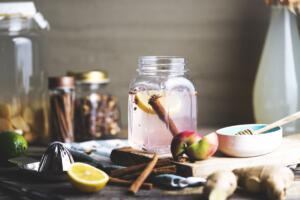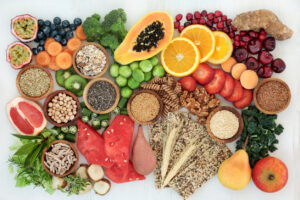You’re not imagining it. The effects of light drinking — one mojito, one beer, one glass of wine—intensify with age as muscle mass is replaced by fat tissue. The rule is the higher the ratio of body fat, the lower the tolerance to liquor.
That’s why so many women – and men – are participating in Dry January. The start of a new year is a great time to cut back on bad habits and get ourselves back to a healthier lifestyle, especially after the over-imbibing that tends to go hand-in-hand with the holiday season. With Dry January, you give yourself the chance to cut back on alcohol and evaluate your drinking habits. There are some who don’t want to quit completely, so they participate in Damp January, where they cut back on alcohol consumption but don’t totally cut it out of their life.
Here are some reasons why cutting back on alcohol – especially for women – is a good idea.
The Effects of Alcohol and Aging are Stronger in Women

Why? Women typically have a higher ratio of body fat than men. Because fat does not absorb alcohol, the same amount of liquor over the years causes higher alcohol concentrations to remain in the bloodstream, where it travels to other tissues and, most importantly, the brain.
Water is another age and gender-related factor. Even for those who imbibe many glasses during the day, the body retains less water with age so that alcohol in the system remains in a more concentrated form for longer. In addition, women retain proportionally less body water than men, and they may also metabolize alcohol in a slightly different way.
Foods high in fat—most late-night snacks like pizza and chips—cause the liver to work overtime and delay its capacity to metabolize alcohol so the byproducts can be excreted. Thus, the conventional wisdom that eating alleviates alcohol’s adverse effects —because food slows down the absorption of alcohol in the stomach and small intestines— is contradicted when high-fat foods interfere with benefits.
The liver metabolizes between 90 and 95% of alcohol consumed, with the rest excreted via urine, breath, and sweat. The longer alcohol remains in the liver, the higher the risk of liver damage. Usually, the body can metabolize alcohol at a speed of about one cocktail/hour unless the liver is overloaded by too much alcohol consumed too quickly or by fatty foods. High levels of alcohol can also interfere with the liver’s ability to handle fat, resulting in a condition called fatty liver, which can eventually lead to cirrhosis.
Other causes of alcohol and aging are familiar: interaction with medications—everything from antihistamines and antibiotics to anti-anxiety and anti-depressant drugs; and the increased stresses of life.
The Effect of Drinking on Getting Your Zzzzzzzs

The negative effects of light drinking on sleep may also worsen with age —along with a general increase in nighttime wakefulness—caused by higher levels of alcohol in the brain. While alcohol may decrease the time needed to fall asleep, it affects levels of serotonin, norepinephrine, and other chemicals that orchestrate sleep.
Even when consumed up to six hours before bedtime, alcohol can interfere with REM sleep—causing more frequent awakenings from dreams and difficulties returning to sleep and reducing the overall quality of rest achieved during the night.
>READ: Brain Power: The Benefits of Oxygen and Sleep
The Next Day and Regrets

That hangovers get worse with age is traced to many of the same issues connected to higher blood alcohol levels: a higher ratio of body fat and less water retention. Just as recovery from a host of insults such as infections and head injuries takes longer with age, hangovers—caused by a complicated inflammatory response—can be more debilitating and hang around for longer.
Heavier drinking creates more serious problems: between 2006 and 2010, some 88,000 Americans died every year of alcohol-related causes, according to the Centers for Disease Control and Prevention—compared to annual deaths from drug overdoses (64,000), breast cancer (42,000), and prostate cancer (28,000). Surveys suggest that more than 15 million American adults suffer from alcohol dependence or abuse within a given year.
The website DrinkWise lists how aging negatively affects the body’s reactions to alcohol—but proceeds quickly to the benefits of “light to moderate” drinking on risks for everything from osteoporosis to dementia, as well as on reducing anxiety and stress. Alleviating depression appears on the benefits list, but because alcohol is a depressant, it can also make existing depression worse, in part related to its effects on sleep: Increased nighttime waking interferes with the deep stages of sleep essential to the brain’s recovery. Also, alcohol interferes with anti-depressant medication.
Finally, as the effects of drinking wear off, feelings of depression and anxiety can become more intense before normal brain activity resumes, according to Aaron White, senior scientific advisor at the National Institute on Alcohol Abuse and Alcoholism.
The main suggestion for minimizing the unwanted effects of alcohol is to drink water or juice between alcoholic drinks, increasing hydration and delaying the next drink. The other, less welcome suggestion: Drink less.
If you want to stop drinking but aren’t able to do it on your own, Monument has an amazing program that you can do from the comfort of your own home. It offers therapist-moderated online groups that provide peer support and expert guidance. With that, you also get confidentiality. You don’t have to take the journey to sobriety alone… if you need help, reach out. It’s there.
Read Next:
This Nightly Ritual…Friend or Foe?
Too Many Drinks Too Fast: Why Are Women Drinking So Much?
7 Tasty Ways to Stay Hydrated This Summer
A version of this story first appeared on mylittlebird.com.







